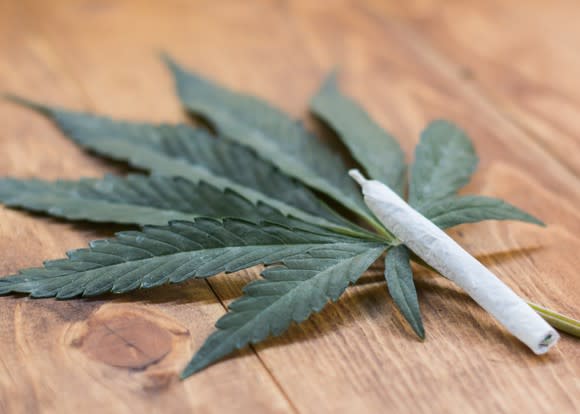Is There a Link Between Marijuana Use and Kidney Disease? The Shocking Answer
What had once been a taboo industry is no more. The marijuana industry is budding before our eyes, and growth has seemingly been unstoppable of late. According to a relatively new report from cannabis research firm ArcView, in partnership with BDS Analytics, legal weed sales in North America are projected to grow by an average of 28% per year through 2021. If accurate, we could be looking at nearly $25 billion in annual legal pot sales in North America by the end of 2021. That's the type of growth that investors love.
We've also seen a dramatic shift in the way the public views cannabis. Back in 1995, the year before marijuana was first legalized in California for compassionate use patients, just 25% of respondents in Gallup's survey favored the idea of legalizing marijuana nationally. However, in its October 2017 poll, an all-time record 64% favored green-lighting pot for adult consumption. A separate poll from Quinnipiac University in August found that 94% of respondents support legalizing cannabis for medicinal purposes, compared with only 4% who oppose it.

Image source: Getty Images.
As a result of this growing acceptance of pot, more and more states have legalized its use -- against federal law, mind you. In total, 29 states have legalized medical marijuana, while nine have OK'd recreational cannabis, including Vermont, which recently became the first to do so entirely by legislative means.
Is there are link between marijuana use and kidney disease? This new study spills the beans
Yet there remain plenty of unanswered questions within the scientific community and among opponents of cannabis about its long-term health impact. Just as tobacco use has been linked to an increased risk of heart disease, cancer, and a host of other ailments, researchers and opponents fear similar risks for those who smoke cannabis.
One such study, which was recently published online in the American Journal of Medicine, aimed to establish whether a link existed between cannabis use and kidney disease. For context, kidney disease is the ninth-leading cause of death in the U.S., with an estimated 31 million people living with chronic kidney disease, whether they've been diagnosed or not.
To investigate this thesis, Dr. Murray Mittleman, a professor of epidemiology at Harvard University's School of Public Health and an associate professor of medicine at Harvard Medical School, and his team reviewed data from 13,995 adults between ages 18 and 59 who took part in the National Health and Nutrition Examination Survey from 2007 to 2014.

Image source: Getty Images.
The results from those who admitted to cannabis use showed that there's pretty convincing evidence that moderate and/or infrequent cannabis users under the age of 60 who are otherwise healthy shouldn't be worried about their kidney function. "Our research provides some reassuring evidence suggesting that there is no detrimental effect of infrequent, relatively light use of marijuana on kidney function among health adults over age 60," said Dr. Mittleman in the report.
However, he also points out that, "[O]ur research does not address heavy users, the elderly, or those with pre-existing chronic kidney disease. Research is needed to evaluate the impact of marijuana use in adults 60 and over, and among those with existing or at risk of developing kidney disease." It's not uncommon for these university-led studies to conclude that more studies need to be conducted. Yet for the time being, it would appear that those who infrequently use cannabis, and are otherwise healthy and under age 60 aren't at risk of worsening their kidney function.
Sorry, folks, this won't change weed's scheduling at the federal level
On one hand, the results of this study provide something of a feather in the caps of legalization enthusiasts. After all, there is growing evidence that cannabis use, or medicinal marijuana, can actually be a positive.
For example, GW Pharmaceuticals' (NASDAQ: GWPH) lead experimental drug Epidiolex, a cannabidiol-based therapeutic, dazzled in multiple late-stage studies for two rare types of childhood-onset epilepsy, Dravet syndrome and Lennox-Gastaut syndrome. In Dravet syndrome, Epidiolex tripled the reduction in seizure frequency from baseline (39%) relative to the placebo (13%). GW Pharmaceuticals' lead drug is currently under review by the Food and Drug Administration (FDA), and the company hopes it'll be approved within months. If given the green light, it'll be the first FDA-approved cannabinoid-based drug.

Image source: GW Pharmaceuticals.
Aside from GW Pharmaceuticals' demonstration that cannabinoids do have medical benefits, we've also seen (via a study published in 2014) that states with medical cannabis laws had an almost 25% lower opioid overdose mortality rate than states that hadn't legalized medical weed, based on states that were legal between 1999 and 2010.
Yet despite this growing body of data and evidence, the federal government is unlikely to alter its scheduling of marijuana anytime soon. As a Schedule I drug, marijuana is entirely illegal, considered to be highly prone to abuse, and has no recognized medical benefits. This classification is also a thorn in the side of pot businesses, leaving many without any access to basic banking services, and making it impossible to take normal corporate income-tax deductions.
What's more, Attorney General Jeff Sessions is directly taking on the marijuana industry. Not happy simply slowing or halting its expansion, Sessions in January rescinded the Cole memo, which had provided a series of "rules" that legalized states agreed to abide by to keep the federal government off their backs. With this memo tossed aside, state prosecutors now have the discretion to bring marijuana charges against individuals and/or businesses, even in legal states.
Long story short: Though the data surrounding cannabis consumption continues to evolve, there looks to be no pathway to progress at the federal level anytime soon.
More From The Motley Fool
Sean Williams has no position in any of the stocks mentioned. The Motley Fool has no position in any of the stocks mentioned. The Motley Fool has a disclosure policy.

 Yahoo Finance
Yahoo Finance 